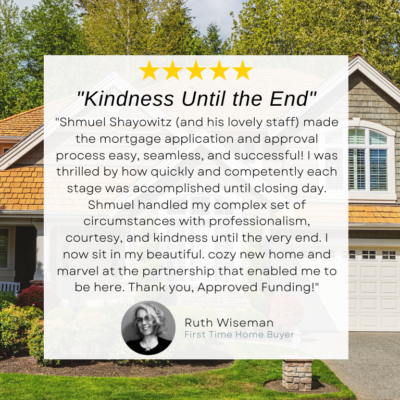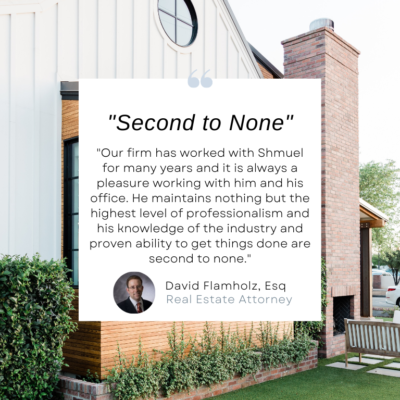By: Shmuel Shayowitz
I was one of the 100 mortgage executives who was invited. Complimentary flights, gorgeous accommodations, extravagant entertainment, kosher meals and luxury gifts were all included. It was an event held by one of the largest mortgage lenders in the US, who wanted to announce their aggressive expansion into the “subprime” mortgage market.
They had workshops and round table sessions educating us about their low-credit programs, which would allow underserved mortgage applicants to get financing. Their robust online system would streamline the need for conventional document verification and automate approvals in seconds. It was the first of its kind.
 Of course, they acknowledged that these loans would be a higher risk to their investors. However, instead of alleviating that threat by requiring bigger down payments or more stringent credentials, all they did was charge a higher interest rate. They went on to train everyone on how to “sell” these higher rate subprime loans and even tailored their technology to incentivize those loan officers who delivered above market rates. And so it began.
Of course, they acknowledged that these loans would be a higher risk to their investors. However, instead of alleviating that threat by requiring bigger down payments or more stringent credentials, all they did was charge a higher interest rate. They went on to train everyone on how to “sell” these higher rate subprime loans and even tailored their technology to incentivize those loan officers who delivered above market rates. And so it began.
Of the 100 executives, I was one of two who refused to participate in this lending program. In my opinion, the added business didn’t seem worth the tremendous risk if and when the loans wouldn’t perform. We were obviously right. I won’t say that we didn’t do any subprime loans over the next 12-18 months, but the loans we did underwrite were all prudent and sensible, with our own internal safeguards that protected our borrowers and us. Then came 2008 and 2009, and the rest, as they say, is history.
Now we fast-forward to 2023. With mortgage rates sharply rising and home prices softening over the past five consecutive months – off their record-breaking peaks – many are asking whether we will be repeating 2008 again? Perhaps I am a contrarian, but I don’t think we will revisit a housing market collapse. I do, however, believe that we are starting to see the onset of a subprime lending crisis. The crisis I am referring to is not in the mortgage market but in the automobile industry.
The auto loan industry might not attract as much attention as the mortgage or student loan industries, but auto loan debt is the third-largest source of debt in the United States. According to Experian, the overall auto debt increased to $1.5 trillion by mid-2022. As rates increased in 2022, auto payments spiked as well. According to Cox Automotive, the average new auto loan rate was 8.02% in December, up from 5.15% a year earlier.
Bloomberg recently reported that Americans are falling behind on their car payments at a higher rate than in 2009. “During the pandemic, a surge in used car prices forced buyers to take out bigger loans for their vehicles. The monthly payments seemed doable in an era of stimulus checks, a tight labor market, and surging stocks, but that’s changed for many people as inflation eats into their budgets and the job market cools.”
In December, the percentage of subprime auto borrowers who were at least 60 days late on their bills rose to 5.67%, up from a seven-year low of 2.58% in April 2021, according to Fitch Ratings. That compares to 5.04% in January 2009, the peak during the Great Recession. “In 2009, unemployment was high, and when there’s high unemployment, delinquencies often turn into defaults which become repossessions,” Cox Automotive’s Mark Schirmer said.
Today we have a “strong” job market (which I think will change in 2023), so the forecast for further automobile delinquencies will only continue to increase. Time will tell. In the meantime, however, I highly recommend that people look into alternative options to see which of their debts, if any, can be mitigated before it begins to impact their credit negatively.
 Shmuel Shayowitz (NMLS#19871) is President and Chief Lending Officer at Approved Funding, a privately held local mortgage banker and direct lender. Approved Funding is a mortgage company offering competitive interest rates as well as specialty niche programs on all types of Residential and Commercial properties. Shmuel has over 20 years of industry experience, including licenses and certifications as a certified mortgage underwriter, residential review appraiser, licensed real estate agent, and direct FHA specialized underwriter. He can be reached via email at Shmuel@approvedfunding.com.
Shmuel Shayowitz (NMLS#19871) is President and Chief Lending Officer at Approved Funding, a privately held local mortgage banker and direct lender. Approved Funding is a mortgage company offering competitive interest rates as well as specialty niche programs on all types of Residential and Commercial properties. Shmuel has over 20 years of industry experience, including licenses and certifications as a certified mortgage underwriter, residential review appraiser, licensed real estate agent, and direct FHA specialized underwriter. He can be reached via email at Shmuel@approvedfunding.com.
Please Complete This Form To Get In Touch With Shmuel






























